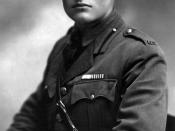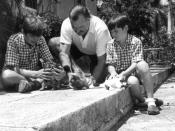Finding the Lost Generation
Every generation has a certain moniker, a name, with which it is commonly associated. The 60s had their "hippies;" the 90s had "Generation-X," while the 20s had the "lost generation," a group of people defined by expatriate writers such as Ernest Hemingway, F. Scott Fitzgerald and Gertrude Stein who wrote about the tough psychological and physical scars of war, and about the apathy and hypocrisy of their contemporaries in the US and abroad. Ernest Hemingway clearly describes this feeling of apathy and general disillusionment in several of his short stories that are part of the In Our Time collection. Stories such as "Soldier's Home" and "Cat in the Rain" show an unambiguous and undeniable sense of loss and confusion in the characters' actions, dialogue and personas. Whether it is the coming home of an overly overdue soldier from World War I as in "Soldier's Home" or the seeming helplessness of the American wife in "Cat in the Rain," Hemingway clearly shows that all is not necessarily good in our time, his time.
In each of the stories discussed, "Soldier's Home" and "Cat in the Rain," Hemingway shows two diametrically opposed reactions to a seemingly similar problem, the inability to adjust in the world after the end of the war. Each of the main characters in these stories deals with this hindering disability in a unique way; yet, all of these stories share an overwhelming inability to adjust to their surroundings, to the life that they should lead, by the main characters, one that deters them from actively participating in normal life. In Krebs' case, in "Soldier's Home," his inability to cope manifested itself in a general depression, a sort of post-traumatic stress...



Thanx 4 the help.
Thanx for the help from this essay, it contains almost everything I needed 2 complete it. Definitely a good peice of work! Thanx.
0 out of 0 people found this comment useful.